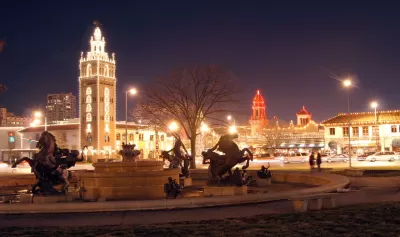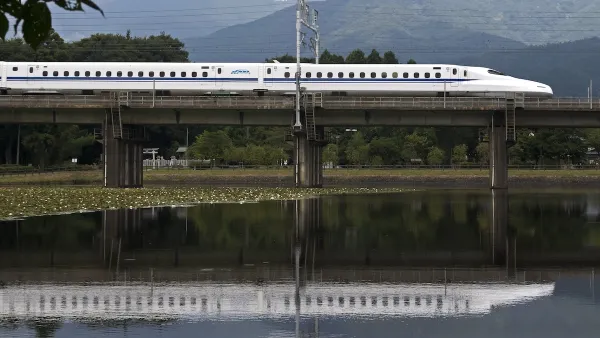Eager for downtown development, Kansas City signed a deal subsidizing Cordish Companies to the tune of $295 million. The rejuvenated district should be self-sustaining. So why is the city still funding Cordish?

In a Next City feature, Sandy Smith tells the story of a desolate downtown and a plan to partner with big developers to make it a place worth visiting.
In 2006, Kansas City issued close to $300 million in bonds to help Cordish Companies build an entertainment district. "Occupying an entire city block with restaurants, bars, nightspots and shops, KC Live [...] would have been unimaginable in Kansas City 15 years ago."
Two years later, the recession hit. Without expected tax revenues, city officials realized they had made a bad bargain. "Kansas City Mayor Sly James has since said that City Hall won't again make deals like the one it made with Cordish, yet the city remains beholden to the agreement in ways that are still emerging."
Smith writes, "But at what point should cities make this decision to stop subsidizing for-profit development? And how do they know when enough is enough? That's the question being asked in Kansas City and in cities around the nation as downtowns bounce back from years of abandonment only to find that developers still expect the aid they were receiving when downtowns were far less profitable places to be."
Part of the problem is historical: "'Urban leaders still tend to overpay for development because they internalized low civic self-esteem bred by decades of being told they were too polluted, too dangerous, or too school-deficient to attract investment,' says Greg LeRoy, executive director of Good Jobs First [...]"
Cities can reap great benefits from redeveloped downtowns. "But in a moment of increasing urban inequality and shrinking government coffers, is it government's job to subsidize amenities for people renting apartments in high-end towers?"
FULL STORY: The $295 Million Mall Taxpayers Bought Kansas City

Planetizen Federal Action Tracker
A weekly monitor of how Trump’s orders and actions are impacting planners and planning in America.

Maui's Vacation Rental Debate Turns Ugly
Verbal attacks, misinformation campaigns and fistfights plague a high-stakes debate to convert thousands of vacation rentals into long-term housing.

San Francisco Suspends Traffic Calming Amidst Record Deaths
Citing “a challenging fiscal landscape,” the city will cease the program on the heels of 42 traffic deaths, including 24 pedestrians.

Amtrak Rolls Out New Orleans to Alabama “Mardi Gras” Train
The new service will operate morning and evening departures between Mobile and New Orleans.

The Subversive Car-Free Guide to Trump's Great American Road Trip
Car-free ways to access Chicagoland’s best tourist attractions.

San Antonio and Austin are Fusing Into one Massive Megaregion
The region spanning the two central Texas cities is growing fast, posing challenges for local infrastructure and water supplies.
Urban Design for Planners 1: Software Tools
This six-course series explores essential urban design concepts using open source software and equips planners with the tools they need to participate fully in the urban design process.
Planning for Universal Design
Learn the tools for implementing Universal Design in planning regulations.
Heyer Gruel & Associates PA
JM Goldson LLC
Custer County Colorado
City of Camden Redevelopment Agency
City of Astoria
Transportation Research & Education Center (TREC) at Portland State University
Jefferson Parish Government
Camden Redevelopment Agency
City of Claremont




























